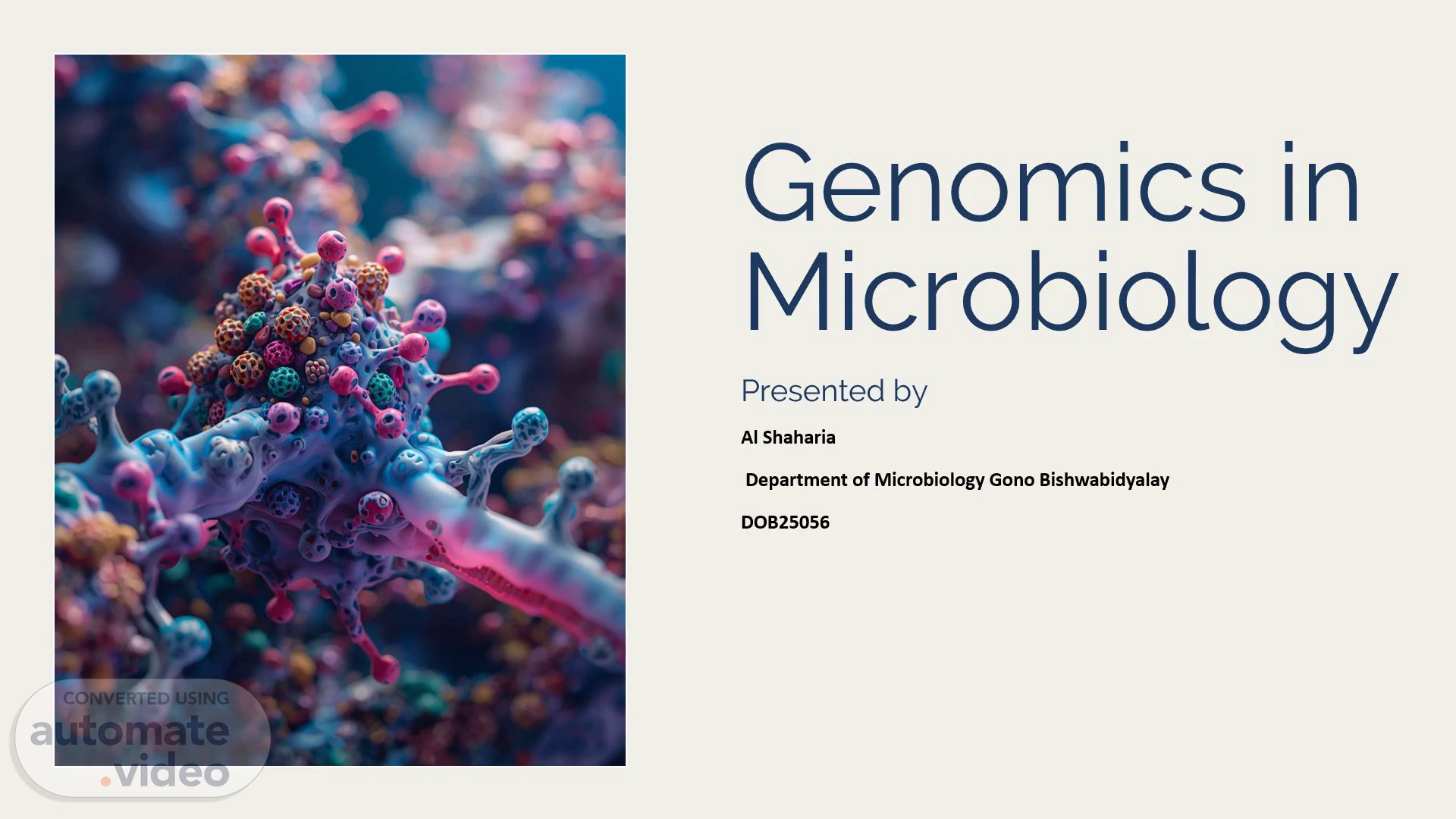Scene 1 (0s)
Genomics in Microbiology Presented by Al Shaharia Department of Microbiology Gono Bishwabidyalay DOB25056.
Scene 2 (3s)
[Audio] The use of genomics in microbiology has led to significant advancements in our understanding of microbial genetics and behavior. Analyzing the complete genetic makeup of microorganisms allows researchers to gain valuable insights into their characteristics, behaviors, and interactions with their environments. This knowledge can be used to develop novel diagnostic tools, track the spread of diseases, and identify potential targets for new treatments. The applications of genomics in microbiology are vast and diverse, including the development of personalized medicine, the improvement of food safety, and the creation of more effective vaccines. Genomic analysis also enables researchers to study the evolution of microorganisms over time, which can inform strategies for disease prevention and control. Furthermore, advances in genomics have facilitated the discovery of new antimicrobial compounds and the development of novel therapeutic agents. The integration of genomics with other disciplines such as ecology and bioinformatics has opened up new avenues for research and has enabled the development of more sophisticated models of microbial ecology. Overall, the use of genomics in microbiology has transformed our understanding of microbial biology and has paved the way for future breakthroughs in this field..
Scene 3 (46s)
[Audio] The study of the entire genetic material of an organism's genome is referred to as genomics. This field of study encompasses various organisms including bacteria, viruses, fungi, and other microorganisms. The analysis of their DNA is a key aspect of genomics. Advanced technologies have enabled researchers to rapidly analyze microbial genomes using techniques like next-generation sequencing. This technology allows for the rapid and accurate determination of microbial genomes..
Scene 4 (1m 4s)
[Audio] Genomics plays a vital role in disease diagnosis, enabling healthcare professionals to identify pathogens directly from clinical samples. This is particularly crucial for detecting fast-spreading diseases such as COVID-19, tuberculosis, and various viral infections. By utilizing genomic techniques, doctors can obtain accurate diagnoses, leading to timely treatment and improved patient outcomes. Genomic analysis also helps in identifying genetic disorders and rare genetic conditions. Furthermore, genomics aids in the detection of antibiotic resistance in bacteria. This is achieved through the identification of specific resistance genes, allowing clinicians to select the most effective antibiotics and implement targeted infection control measures. Genomics provides valuable insights into the evolutionary history of organisms, which can inform conservation efforts. Additionally, whole-genome sequencing enables researchers to analyze bacterial strains and track the spread of outbreaks. This information is invaluable for hospital infection control, food safety investigations, and national disease surveillance efforts. By monitoring the evolution of bacterial populations, scientists can develop more effective strategies for preventing and controlling infectious disease outbreaks..
Scene 5 (1m 47s)
[Audio] Genomics provides numerous benefits in the field of microbiology, particularly when it comes to understanding microbial diversity and disease diagnosis. The first benefit is that genomics allows us to uncover hidden microbial species in various environments, expanding our knowledge of the diverse range of microorganisms present in ecosystems. This enhanced understanding of microbial diversity enables researchers to better comprehend the complex interactions between microorganisms and their environments. The second benefit is that genomics plays a crucial role in disease diagnosis and treatment by providing rapid and accurate pathogen identification and analysis. With genomic tools, healthcare professionals can quickly identify the causative agent of a disease, allowing for timely and targeted treatment. Furthermore, genomics facilitates the development of novel diagnostic tests and treatments, ultimately leading to improved patient outcomes. In addition, genomics helps to combat antimicrobial resistance by enabling the detection of resistant strains, thereby informing strategies to mitigate this growing concern. Overall, the benefits of microbial genomics are multifaceted, with far-reaching implications for our understanding of microbial diversity and disease diagnosis..
Scene 6 (2m 31s)
[Audio] The use of genomics in medicine has led to numerous breakthroughs in disease diagnosis and treatment. The ability to sequence genomes quickly and accurately has enabled researchers to identify genetic markers associated with various diseases. This information can be used to develop targeted therapies that are tailored to specific patient populations. Additionally, genomics has played a crucial role in the discovery of new antimicrobial agents, which have helped to combat antibiotic-resistant bacteria. Furthermore, the application of genomics in personalized medicine has improved patient outcomes by allowing clinicians to make informed decisions based on individual genetic profiles. The integration of genomics with other medical specialties has also enhanced the effectiveness of treatments, particularly in cases involving complex diseases. Overall, the power of genomics has transformed the way we approach healthcare, enabling us to tackle some of the most pressing challenges facing humanity..
